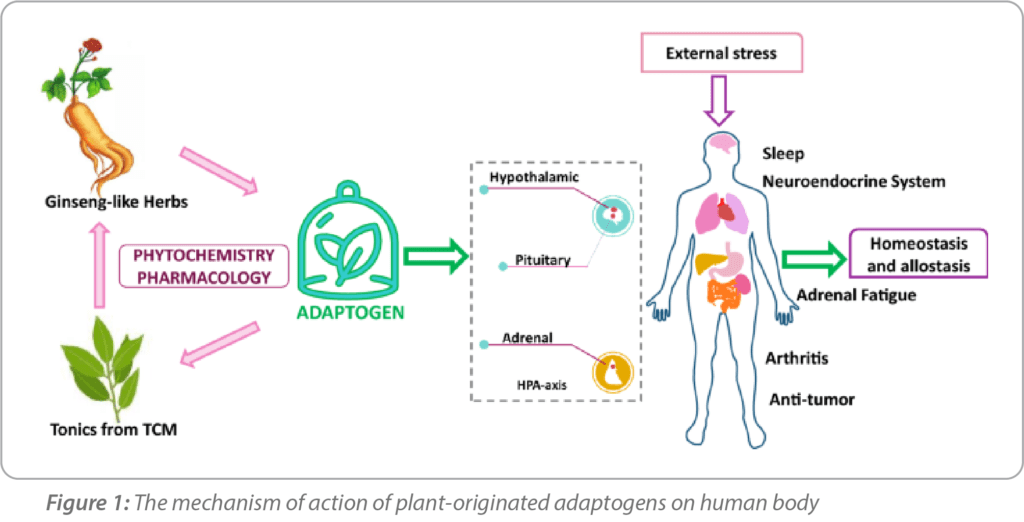In a fast-paced world filled with demands and stressors, the need for natural solutions to support well-being is more crucial than ever. One such powerful ally in this pursuit is the realm of adaptogens—botanicals that have long been known for their ability to help the body restore balance and strengthen its resistance to physical, mental, and emotional stress. These remarkable substances play a significant role in enhancing immune function, reducing fatigue, improving endurance and stamina, and promoting a healthy mood.

Understanding Adaptogens and Their Role
Adaptogens are a class of plants that have been used in traditional practices, particularly in Ayurveda and traditional Chinese practices, for centuries. They are renowned for their unique ability to help the body adapt to stressors, bringing the body to a state of homeostasis, or internal stability, which, in turn, can lead to improved overall well-being. Adaptogens are non-specific in their actions, meaning they assist the body’s various systems in responding to a wide range of stressors rather than targeting a specific organ or system.
Adaptogens work through multi-targeted and multi-channel mechanisms, particularly via the neuro-endocrine-immune system and the hypothalamic–pituitary–adrenal (HPA) axis, the main system involved in the body’s stress response.
When we face stress, the body releases cortisol and other stress-related hormones to help us cope. But the long-term activation of the stress response system and too much exposure to cortisol and other stress hormones can disrupt almost all the body’s processes. Adaptogens help regulate and achieve balance in the production of these hormones, allowing the body to better manage stress and alleviate stress-related symptoms. Similarly, adaptogens may also influence the levels and activities of neurotransmitters in the brain, stabilizing mood, reducing anxiety, and improving overall mental well-being.
Adaptogens also often have antioxidant properties, which means they help combat oxidative stress by neutralizing harmful free radicals in the body. Oxidative stress can contribute to various health issues, including chronic conditions and the aging process.

The Immune System Connection
It is well known that stress, inflammation and immune system health are all closely related. When the body experiences stress, the immune system responds by heightening inflammation in the body. This reaction is normal, however when the stress and inflammation are chronic, this can lead to the long-term suppression of the immune system and changes in immune cell distribution and function, making individuals more susceptible to illnesses.
Many adaptogens are believed to have immunomodulatory effects, meaning they can bolster the body’s defenses against health challenges and help regulate the immune system. They may enhance the body’s immune response to pathogens and other stressors, helping to maintain overall health and resilience.
Notable Adaptogens and Their Properties
Here are 5 prominent adaptogens with immune-stimulating and inflammation-modulating properties:
1. Astragalus
Astragalus is esteemed for its immune-enhancing effects, promoting a robust immune system and supporting overall vitality. According to a published Review, “Immune System Effects of Echinacea, Ginseng, and Astragalus,” astragalus increases the production of white blood cells, particularly T cells and macrophages, which have key roles in boosting the immune system.
2. Reishi Mushroom
Beyond providing support for the immune system, reishi also produces calming effects in the body, promotes a healthy mood and provides relief from anxiousness and stress.
3. Holy Basil (Tulsi or Ocimum sanctum)
Holy Basil is renowned for its ability to combat stress and anxiousness, promoting a sense of calm and mental clarity. It also possesses immune-stimulating properties.
4. Echinacea
Consisting of 3 main species, Echinacea purpurea, Echinacea angustifolia and Echinacea pallida, this botanical is a well-known immune booster, aiding the body in fighting off pathogens and improving overall immune function. It has been studied for its ability to minimize both the duration and severity of cold symptoms while also activating innate immune cells such as macrophage phagocyte, natural killer (NK) cells and cytokines. The combination of the purpurea and angustifolia species within the same echinacea family offers a balance of beneficial compounds and synergistic actions that may enhance overall immune-supportive effects.
5. Andrographis
With its potent immune-enhancing properties, Andrographis assists the body in fighting off various immune challenges.
Each adaptogen works in its own unique way to help normalize physiological functions and restore overall well-being. It is important to note that with certain populations, such as individuals with autoimmune disorders or mental health conditions, caution or avoidance of use is advisable. While more scientific research is needed to fully understand their mechanisms of action and effectiveness, adaptogens offer many advantages for the general population.
References
Block KI, Mead MN. Immune System Effects of Echinacea, Ginseng, and Astragalus: A Review. Integrative Therapies. 2003;2(3):247-267.
Liao LY, He YF, Li L, Meng H, Dong YM, Yi F, Xiao PG. A preliminary review of studies on adaptogens: comparison of their bioactivity in TCM with that of ginseng-like herbs used worldwide. Chin Med. 2018 Nov 16;13:57.
Weaver, Ruth. “The 3 types of echinacea: A comparison of medicinal actions.” Herbal Reality, 24 January 2022.
Zhai Z, Liu Y, Wu L, Senchina DS, Wurtele ES, Murphy PA, Kohut ML, Cunnick JE. Enhancement of innate and adaptive immune functions by multiple Echinacea species. J Med Food. 2007 Sep;10(3):423-34.

